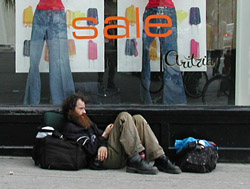 July 14, 2011
July 14, 2011
When talking up Compression Thinking at the Lean Enterprise Research Center in Cardiff, Wales, one set of questions there differed from discussions in the United States: what is implied by “quality of life?”
Compression Thinking hinges together two opposing ideas:
- Since we do not have an infinite supply of natural resources, our historical pattern of accelerating industrial development cannot long continue. That’s a hypothesis. Some interlocking evidence supports it. Conclusion: our use of natural resources needs to decline, not increase, but human population is increasing.
- Despite this, we think that we should enable everyone on earth to have a reasonable “quality of life.” That’s a values statement of the right thing to do.
Reconciling this conflict sets up discussing quality of life, a subjective concept. Each of us has our own preferences, which are apt to be buried in unquestioned assumptions. Personal quality of life opens topics from shopping mania to seeing doctors. Few of us crave to live like the guy in the photo above, whether he fell into that state by his own doing, or by someone else’s. At the same time, one hears of profligate consumers who don newly bought clothes each day rather than do laundry.
At a minimum, quality of life is fed, clothed, warmed, sheltered, and healthy; but it is more than that. In organizations from the UN to The Economist, various quality of life indices include factors from equality of justice to a popsicle index (the % of people who think that a child can safely walk the streets to buy a popsicle). Only one factor in a list of a dozen or so may relate to wealth or spending, and some surveys probe fuzzy concepts like happiness, wellbeing, and life satisfaction.
Severe deprivation clearly reduces quality of life, but once basics are met, extra consumption is foggily related to it. However, if someone insists that a private jet with a built-in Jacuzzi is essential to her quality of life, and can afford it, can’t she have it?
That’s the conundrum. Technology has only begun to let us make much more effective use of a limited stock of resources, but flagrant use of them has to become a violation of social norms. That’s a huge change in belief from regarding conspicuous consumption as a status symbol. Many of us have an innate urge to embellish our persona with distinctive bling, but in societies with limited resources, these quirks may symbolize personal restraint rather than extravagance. Promotion of social recognition does not have to squander resources.
This conundrum extends to companies and the commercial system for evaluating success. It’s also a huge shift from regarding more as better to helping your customers have better outcomes while using much less. That’s quality over quantity, always.
We’ve barely begun to make an emotional shift of this magnitude.
